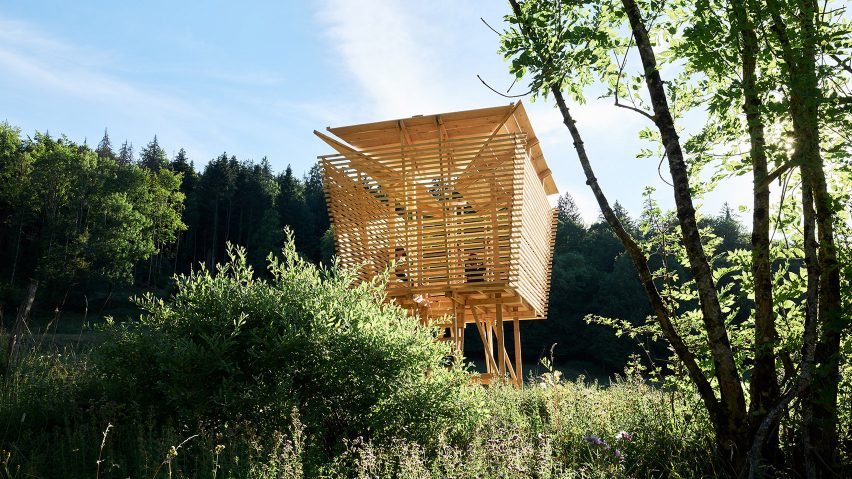Organiser Philippe Burguet has chosen eight of his favourite designs from the annual architecture competition Le Festival des Cabanes, which showcases 14 wooden cabins.
This year's edition of the Le Festival des Cabanes, or The Cabins Festival, which attracts around 30,000 visitors to Lake Annecy, France, each year, displays 14 wooden cabins made from wood types found in the surrounding Savoyard forests.
Participants were tasked with designing a cabin around the 2022 theme "between architecture and landscape". The winning designs were selected by an independent panel of architects.
"The philosophy of the festival is to embrace a territory, a place, an environment – to put it simply, rediscover a harmonious relationship between architecture and landscape," Burguet explained.
"Our times are paradoxical in that humanity has never built so much, but it is very rare to be able to be in the presence of quality architecture," he added. "This is the disciplinary field that we defend."
Each hut is no bigger than six square metres and has been made in partnership with local sawmills and the National Forestry Board.
According to Burguet, the huts will be disassembled after the festival and the wood will be repurposed.
"After the festival, the huts are dismantled and reused to build new structures such as chicken coops or garden sheds," he said.
Below, Burguet chooses eight wooden structures on show at the festival:
Le Bosquet de l'Ire by Joseph Linden, Solene, Duhaze and Adrien LeClercq
"The Bosquet de d'Ire is a transitional space between a busy, open clearing and a more intimate river bank. The visitor is immersed in the heart of a forest of wooden slats, occasionally framing remarkable landscape elements which are unique to the location. They can relax in a cool space under the shade generated by the architecture.
"The construction is like a peaceful path bringing serenity to the visitor, connecting them to the lapping water of the river, the trees of the clearing and the mountains of the valley."
La Bête by Tom Maennel and David Bienvenu
"The Beast contemplates the landscape before returning to hide in the woods. It is a magical structure that knows how to remain just and perfectly contextualised. The woodwork and the shape of the curves and its proportions make us adore this animal."
Paravue by Quentin Barthe, Tom Patnotte and Martin Gaufryau
"Here, the hut inverts solids and voids. The opacity of the walls contrasts the veil of fabric, creating an opaline [milky] effect which is similar to Japanese rice paper panels. Colours and shapes fade and create an abstract image of the exterior of the hut. I also perceive the outside and feel through the vibration of the wind on the walls."
Le Garde Fou by Philippe Paumelle and Nils Galloy
"Both imposing and light, the architecture here is intriguing: its movement, the route offered inside or the climbing offered outside, are all ways to discover this hut which is designed to be a bell. The bell tower is sheltered under the bell and is anchored in the ground."
From the Shadow to the Light by Joël Bastide, Florent Gadois, Lucien Magne, Loïc Moine and Charles Pichon
"This hut offers a unique journey. It is dark and austere on the outside, then we enter a dark space where the vertical lines of light gradually turn into oblique lines. Inside, we find ourselves in the centre of a circle of light, that travels from floor to ceiling."
Impluvium by Manuel Rossi, Mehdi Wermuth, Evan Rivadeau Dumas, Pablo Fillit, Ncuti Paris and Antonio Pagano
"Impluvium demonstrates that very technical architectural know-how can be forgotten to give a sensitive, human and poetic dimension to architecture. Despite its imposing volume, this cabin remains light, airy and very elegant. It allows you to fully enjoy the landscape without being seen. On rainy days you can sit above the cows and watch them drink. An unforgettable experience."
Portes de la Perception by Rose Schwab, Javier Ahumada and Philippe Cegielny
"A somewhat crazy bet for this team of architects who dared to reinterpret the architectural codes of the 14th-century chapel with a simple hut made of wooden planks. The result is sensitive and fine. The architecture of the hut offers a perfect and very elegant transition between the chapel and the river."
Le Mazot by Martin Creach, Pierre Manoukian, Léo Grimonet, Léo Chanfray and Théo Ricard
"This hut offers a brilliant interpretation of local architecture where tradition and modernity blend happily. The rainwater is channelled along a wooden path and returned to the meadow. The triangular hut stands like an open book for meditation and rest."
The photography is by David Foessel.
The Cabins Festival is open until 15 November. See Dezeen Events Guide for an up-to-date list of architecture and design events taking place around the world.

